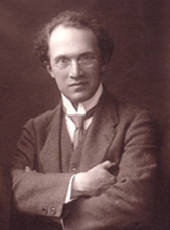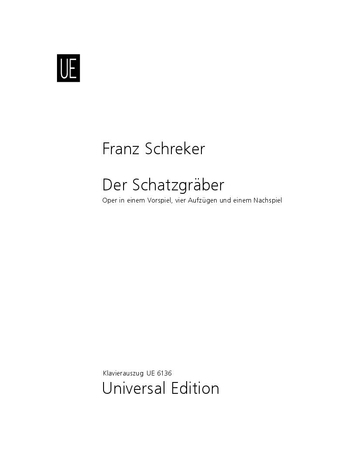

Franz Schreker
Der Schatzgräber
Short instrumentation: 3 3 3 3 - 4 3 3 1 - timp, perc(4), high bells, hp(2), cel, str; stage music: 3 hn, 3 tpt
Duration: 145'
Libretto von: Franz Schreker
Thematische Analyse von: Richard Specht
Dedication: der Stadt Frankfurt am Main und ihrem Opernhause in Dankbarkeit zugeeignet
Choir: SATB
In the orchestra pit: mezzo-soprano, 1st alto, 2nd alto
Roles:
Der König
high bass
Die Königin
silent part
Der Kanzler
tenor
Der Graf
baritone
Der Magister
bass
Der Narr
tenor
Der Vogt
baritone
Der Junker
baritone or high bass
Elis
tenor
Der Schultheiß
bass
Der Schreiber
tenor
Der Wirt
bass
Els
soprano
Albi
lyric tenor
Ein Landsknecht
low bass
Erster Bürger
tenor
Zweiter Bürger
baritone
Dritter Bürger
bass
Erste alte Jungfer
mezzo-soprano
Zweite alte Jungfer
mezzo-soprano (or alto)
Ein Weib
alto (or mezzo-soprano)
Herzöge / Grafen / Ritter / Edle und ihre Frauen / Landsknechte (Soldaten) / Mönche / ein Henker / ein Büttel / Volk.
Instrumentation details:
1st flute
2nd flute
3rd flute (+picc)
1st oboe
2nd oboe
cor anglais
1st clarinet in A (+cl(Bb))
2nd clarinet in A (+cl(Bb))
bass clarinet in Bb
1st bassoon
2nd bassoon
contrabassoon
1st horn in F
2nd horn in F
3rd horn in F
4th horn in F
1st trumpet in C
2nd trumpet in C
3rd trumpet in C
1st trombone
2nd trombone
3rd trombone
bass tuba
timpani
percussion(4)
high bells
1st harp
2nd harp
celesta
violin I
violin II
viola
violoncello
contrabass
stage music: 1st horn in F
2nd horn in F
3rd horn in F
1st trumpet in C
2nd trumpet in C
3rd trumpet in C
Schreker - Der Schatzgräber
Sample pages
Audio preview
Work introduction
Der Schatzgräber was regarded as one of the most-performed operas of the Weimar Republic and brought Schreker his greatest success on stage. There is evidence of 385 performances in 50 different cities between its premiere in 1920 and 1932. Branded by the National Socialists as “degenerate”, the opera faded into obscurity and only experienced its renaissance towards the end of the 20th century. Schreker wrote the libretto himself, inspired by the encounter with a young girl who sang him folk songs and ballads accompanied by the lute. The immense success on stage must have been helped by the fairy tale character of the text, but it was particularly due to the music: without ever seeming trivial, Schreker’s music for the Schatzgräber is plainer and harmonically simpler than in his earlier operas. None of his other operas achieved this level of folksiness. The comparatively transparent orchestral language and the entirely tonal, yet still chromatic harmony was reconciled with even the most conservative minds that were overstrained by the opulent sound of his other operas.
The storyline in the work has a mediaeval fairy tale setting and recounts the tale of an ailing queen whose jewellery has disappeared – the source of her beauty and fertility. Following the advice of his court jester, the worried king employs the travelling singer Elis as a “special investigator”, whose magical lute is able to find hidden treasure. Elis and Els meet in an inn. Els, a typical Schreker femme fatale, is paired off by her father, but she dislikes her prospective husband intensely and therefore arranges for him to be murdered by her servant Albi the day before their wedding. Before the deed, however, he has to steal the queen’s jewellery as a wedding present. Elis gives Els an emerald necklace that he found in the forest. They fall in love. When Els’ bridegroom is found murdered, suspicion falls on Elis. He only avoids execution because the king requires his help in order to track down the queen’s jewellery. Elis has no idea that this is the jewellery that he has given Els. In order to prevent Elis finding her with the queen’s jewels, Els asks Albi to steal his magical lute. After an intoxicating night together, she gives Elis the jewellery on the condition that he never asks her about how she received it. While Elis is celebrated at the king’s court, Albi confesses that he murdered Els’ lover and stole the lute. Els is going to be put to death, but the jester reminds the king about his promise. He takes Els as his wife. When she is dying, the jester fetches Elis, who sings a final song for her. She dies in his arms.


